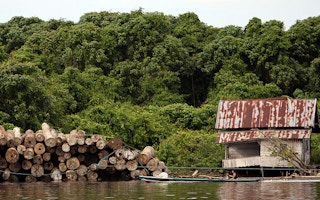A report released earlier this month presents the most comprehensive scientific analysis of illegal logging ever published. Its findings indicate a third of the tropical timber traded globally comes from illegal deforestation, and that regulation loopholes along with an uptick in organised criminal networks are bolstering the illicit activity.
The report, titled “Illegal Logging and Related Timber Trade – Dimensions, Drivers, Impacts and Responses” was produced by more than 40 scientists around the world, and was coordinated by the International Union of Forest Research Organisations (IUFRO) in association with the Collaborative Partnership on Forests (CPF).
“Forestry crime including corporate crimes and illegal logging account for up to $152 billion every year, more than all official development aid combined,” said Erik Solheim, Head of UN Environment, one of the partner organisations supporting the assessment.
It finds that bilateral trade agreements between producer and consumer countries – e.g., the European Union’s Forest Law Enforcement, Governance and Trade Action Plan (FLEGT) that requires timber products imported into the EU be legally harvested – have prompted shifts in the timber trade to less restrictive domestic markets.
“
Forestry crime including corporate crimes and illegal logging account for up to $152 billion every year, more than all official development aid combined.
Erik Solheim, executive director, United Nations Environment Programme
The researchers also found jumps in exports to India and China, which have less stringent regulations and are now the biggest importers of both legal and illegal tropical wood.
The report states illegal logging present in all tropical nations, but highlights Brazil, Indonesia, and Malaysia as the world’s dominant timber producer countries. Indonesia tops the list, generating around 65 million cubic meters of wood-based products in 2013, around 60 per cent of which are estimated to have come from illegally harvested timber.
The Democratic Republic of the Congo (DRC) tops the list of countries with the largest proportions of illicit timber, with more than 90 percent of its production illegally sourced. The report draws on research that pegs Cambodia at 90 per cent illegal production; Bolivia, Peru, and Laos come in at around 80 per cent each.
In terms of non-tropical timber, Russia now appears to be the main source of boreal and temperate wood. The researchers estimate around 20 per cent of Russia’s timber products come from illegal logging, and that 96 per cent of its hardwood is exported to China where it is manufactured into flooring, furniture, and other products. These are sold domestically as well as to markets in Europe, Japan, and the U.S.
Research discussed in the report indicates around 30 per cent of the world’s timber is coming from illegal forest conversion, which is being done primarily for agricultural purposes like palm oil, beef, and soy production. Termed “conversion timber,” illegally soured wood from forest clearing has risen in recent years, according to the report.
The report highlights organised crime and insecure land rights as big contributors to illegal logging activities around the world. It draws on research that shows illegally extracted natural resources, such as timber, were used to buy weapons during war and conflict in western Africa – namely the DRC, Liberia, and Sierra Leone. In the DRC, ongoing conflict in the eastern part of the country is still funded in part through exploitation of natural resources.
Land tenure issues are “profound drivers” of illegal logging, according to the report. It finds that despite around 86 per cent of the world’s forests being publicly owned, only around 60 per cent are managed by the communities that reside in them. And less than a fifth have land rights that are officially recognised.
Previous analyses found that land held and managed by local and indigenous communities tend to be significantly less affected by deforestation than even government-managed areas.
The report’s authors and those affiliated with it write that although more data is needed to shed more light on the context and extent of illegal logging, what they’ve uncovered so far shows that it’s a serious criminal activity. They urge the development of effective policy, as well as more cooperation in the fight against illegal logging.
“In addition to bilateral efforts, stronger international cooperation is needed globally to successfully fight illegal logging and related timber trade and prevent it from shifting to less regulated markets,” Alexander Buck, IUFRO Executive Director, said in a statement.
“We must also recognise that illegal logging is not merely a forest-related problem to be resolved by the ministries dealing with the forest and environment sectors alone. Illegal conversion of forests to agricultural land is an example that clearly shows the need for a broader cooperation, in this case between forestry and agriculture.”
The benefits of reducing illegal logging could echo beyond forests themselves – to the communities that live within and depend on them, as well as to those affected by organised crime.
“We urgently have to come up with new strategies to eliminate illegal timber production and related trade. This could also significantly improve the lives of poor and disadvantaged people and protect them from criminal cartels,” Solheim said. “When the scientific evidence is clear, as it is in this report, it enables policy makers to act.”
This story was published with permission from Mongabay.com.










